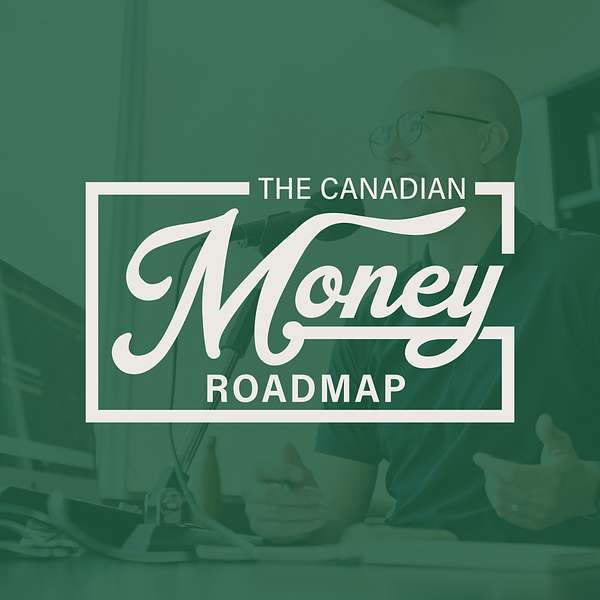
The Canadian Money Roadmap
Invest smarter, master your money, live & give more
The Canadian Money Roadmap
Do you plan to work in retirement?
Use Left/Right to seek, Home/End to jump to start or end. Hold shift to jump forward or backward.
EPISODE SUMMARY
Today’s episode continues our series highlighting the items from my retirement readiness checklist. Get your copy by downloading the checklist from the link below!
Working in retirement is a bit of an oxymoron but many people choose to pick up jobs to supplement their income, stay active or even start a business in a new field entirely!
You’ll want to watch out for tax and OAS clawback when earning employment income in retirement.
✅ DOWNLOAD FREE RETIREMENT READINESS CHECKLIST
TOPICS IN THIS EPISODE
- Why Canadians work in retirement
- What does retirement employment typically look like
- How your employment income is taxed
- How employment income affects other retirement income sources
RESOURCES MENTIONED
Government of Canada - OAS Recovery Tax
OTHER EPISODES
27. Will you Have any Guaranteed Sources of Income in Retirement
30. How Much Will You Get From the Canada Pension Plan?
31. That Other Government Pension Plan…OAS (Old Age Security)
If you enjoy listening to the podcast, please leave a 5 star review on Apple Podcasts
🌳 Connect with Evan and Cedar Point Wealth | Services and Pricing
🗣️ I want to hear from you! Record your comment or question here and you could be featured on an upcoming episode of the podcast
✨ Get your money organized - Your Full Financial Picture Spreadsheet
Hello, and welcome back to the Canadian Money Roadmap podcast. I'm your host Evan Neufeld.
Today we're continuing with my series, going through the items on my retirement readiness checklist and today we're going to be talking about having employment income in retirement.
Okay as I mentioned in the intro, we're going through my retirement readiness checklist and there's a number of items here, they're not an exhaustive list of things that you need to be able to retire, but it covers off a lot of the big questions that you're going to face. To take a look at them before you retire will prepare you before you take that leap and get your last paycheque.
So today we're going to be talking about having employment income in retirement. This one's a little bit interesting and at first I said that my goal was to get people to understand each of these items so they would know how to answer things on the checklist. So the checklist has a yes, no, and I don't know column and most people are probably still going to do an I don't know for whether you're going to have employment income or not.
When it comes to having employment income in retirement, a lot of Canadians anticipate having some. There's a variety of reasons why, but the vast majority of them say that they're going to be relying on employment income to supplement their retirement. So retirement and employment, those are kind of an oxymoron here I guess, because in our office anyways, the goal is to get clients to be able to retire once and if they choose to work after that, well hopefully it will be for things like staying active and keeping them busy and giving a sense of purpose and enjoying work for social reasons and things like that. Not necessarily because they have to. I can do my part of course, but that's that's up to every individual to be able to plan ahead and plan for that.
I'm going to be making reference to some numbers here in this episode. And that is coming from the Fidelity Investments Retirement 2020 survey. I'm going to have a link to that in the show notes below. Some really interesting data there and so what it does is they actually take a look at what pre-retirees say and what actual retirees are saying and this is a pretty comprehensive academic survey here. So of course the results aren’t a perfect swath of the entire Canadian population, but it's probably pretty good.
So when surveying pre-retirees the question was, do you believe that you will be working in retirement, 64% of Canadians said yes. Now when they surveyed retirees, only 28% of retirees actually are working in retirement. Now that could be a good news story. You could see maybe people are actually in better financial positions than they are, but you could also see that as a bad news story where maybe people that were planning to work in retirement, actually haven't been able to find work for a variety of reasons that could be. So they're forced away from working, not having the right skills or things that are in demand now, but even willingness to, so, once you get into retirement mode and you can play golf and see your friends and travel. Sometimes all the hours in the day end up getting taken and you don't even have time to do much working anymore.
So oftentimes what I've seen is that if you and your spouse retire at different times, there's often a period where the early retiring spouse finds a little part-time job or something like that for the sake of keeping busy and something to do until their spouse retires. That's something common that I have seen, but again, back on this survey when asking pre-retirees and retirees, what were the financial reasons why they wanted to work in retirement? To me, that was really encouraging how it was answered because of pre-retirees, 62% of them answered this. And 73% of retirees said that they would like extra money so that they can do more of what they want to do in retirement.
So travel hobbies and things like that. That's fantastic. And less than half said that they need the money to support myself or my spouse. That's great because you want to think of employment in retirement as maybe you're back up, as opposed to something that you rely on because of those factors that I mentioned before.
So things like your health, skill change and even willingness. So if you're relying on employment income, your retirement can be much more challenging that way, because the choice isn't always up to you.
Now, what does employment in retirement often look like? I actually work with a number of clients who have started new careers entirely in retirement. So they were doing one thing and now they pivoted completely. So that came from a desire to learn a new skill and so went back to school or did a trade program or something like that and now they've started their own business and really thriving in that. And other people for example, I brought my vehicle into the dealership last week or a couple of weeks ago and the guy that drove me back to the office in the shuttle, he said that was his retirement gig. And he absolutely loves it because he gets to talk to people all day and he does one week on one week off and he travels on the week off and he has a great time doing that.
So there's all sorts of different things that you can do in retirement. Doesn't have to just be the greeter at Walmart stereotype. But there are some things that you want to keep in mind when it comes to working in retirement. The first one is tax. So one thing to keep in mind is that there is no status with the government or anything like that that says I am a retired person and changes your tax rate or how you're treated or anything like that. Retirement is just something that people choose and it's just a term that people have accepted for that time of life, where they're choosing to work.
So as far as tax goes, tax is treated exactly the same way. So if you are earning income, it's going to be tax exactly the same way as if it was during your regular career years. The problem that you might run into here is if you have already converted your RRSPs to RRIFs and your LIRAs to LIFs, again these are buckets that will have holes in them and there's minimum amounts that you have to take out of these plans. All of those withdrawals are also taxable income. So if you add on employment income on top of that, you might bump yourself up into the next tax bracket and you might end up paying more tax than you originally anticipate. If you have traditional employment, the way that they take tax off your paycheque is usually based on how much employment income they're providing to you and they are not aware of any other investment account withdrawals that you're going to be taking from. So the problem that you might run into with employment income in retirement is that you have multiple sources of income, and none of them are talking to each other until tax time comes around and you might not have enough tax being withheld at the source.
So you might want to set aside a little bit extra cash just in case you have an unexpected tax bill at the end of the year.
Kind of dovetailing into the tax conversation is something called old age security claw back, a bit of a mouthful here and I'm going to get to a specific episode on old age security or OAS in the coming weeks. But OAS has a government benefit that you get at age 65, and it is paid to you regardless of you being employed now or in the past, but you're just a 65 year old Canadian.
The way that this government benefit works is that if you have taxable income at a certain threshold, your OAS benefit gets reduced at a certain amount of money. Now that goes up every year. And I believe this year it's right around $78,000.
So most people don't really have to worry about that. But if you are making those RRIF and LIF withdrawals, plus having employment income, I've seen it before where people have more income than they really anticipate. You might find yourself in a bit of trouble there and you might have to pay some OAS back. One way to get around that is that if you're still under the age of 71, while you're in this case, you can still make RRSP contributions, even if you've converted some of your RRSPs over to RRIFs. And so of course, an RRSP can reduce your taxable income so that you can get under the OAS clawback threshold.
That's getting into some more details that we probably don't need to get into today, but those are some things to keep in mind that having income is great, but having multiple sources of income, especially from investment account withdrawals and employment can put you in a little bit of hot water, depending on how much you are taking.
So to wrap this episode up here. Working in retirement can be a great way to be able to spend a little bit more on the things that you want to in retirement. But if you're using employment income as a means of fully funding your retirement, unfortunately the statistics are showing that you might not be able to do that as well as you might anticipate.
So again 68% of pre-retirees are planning to have employment income and only 28% are really having some, so make sure that you're planning long enough in advance so that you can use your employment income in retirement or your employment in general to be used for things like spending more on the things you want, learning new skills and being social.
And if those things don't pan out, out of choices outside of your control, or you just decide, you don't want to anymore, you can comfortably make that choice.
Thanks for joining me today on the Canadian Money Roadmap podcast. If you enjoyed today's episode, I'd really appreciate if you left me a review on apple podcasts with your biggest takeaway. If you have questions or ideas for topics you'd like me to discuss on future episodes, please reach out via my contact info in the show notes.
This podcast is intended to be educational in nature, and you should always consult your finance, tax and legal advisors before making changes to your financial plan. Any rates of return discussed are historical or hypothetical and are to be used for educational purposes only. Evan Neufeld is a Qualified Associate Financial Planner and Registered Investment Fund advisor. Mutual funds are provided through Sterling Mutuals Inc.
Podcasts we love
Check out these other fine podcasts recommended by us, not an algorithm.

The Rational Reminder Podcast
Benjamin Felix, Cameron Passmore, and Dan Bortolotti
Animal Spirits Podcast
The Compound
The Intelligence from The Economist
The Economist
The Compound and Friends
The Compound
Trillions
Bloomberg
The Journal.
The Wall Street Journal & Spotify Studios
Standard Deviations with Dr. Daniel Crosby
Dr. Daniel Crosby
